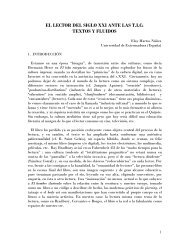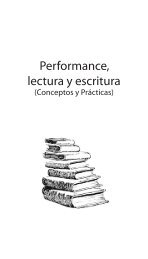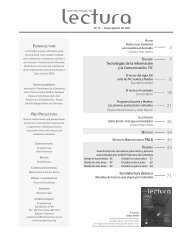- Page 1 and 2:
Prácticas de lectura y escritura
- Page 3 and 4:
Eloy Martos Tania M. K. Rösing (Co
- Page 5 and 6:
Sumario PRÓLOGO Las prácticas de
- Page 7 and 8:
Universidad de Extremadura Nuevos t
- Page 9:
PRÓLOGO
- Page 12 and 13:
tica, no es fácil articular temas
- Page 14 and 15:
sitarios de nuestras Universidades
- Page 16 and 17:
“High Culture” siempre ha tenid
- Page 18 and 19:
género histórico-romántico como
- Page 20 and 21:
Como Capital Nacional de la Literat
- Page 22 and 23:
viejos y los nuevos lenguajes y par
- Page 24 and 25:
sa y dominada por el mercado pero t
- Page 27:
ESTUDIOS Universidad de Almería
- Page 30 and 31:
de obras y autores, sin apenas una
- Page 32 and 33:
afán recopilador como es bien sabi
- Page 34 and 35:
Hegelianismo, es decir, o admitir l
- Page 36 and 37:
Veremos pues que es necesario rompe
- Page 38 and 39:
Vemos pues que de lo que se trataba
- Page 40 and 41:
lo que ello conlleva. Si se buscan
- Page 42 and 43:
las convenciones sociales, converti
- Page 44 and 45:
azar. Por ello, debido a ese cúmul
- Page 46 and 47:
pero es indiferente a las emociones
- Page 48 and 49:
pués, Lazarillo de Tormes o Guzmá
- Page 50 and 51:
de todo punto el ejercicio de la ca
- Page 52 and 53:
del anunciante, el tartamudeo anacr
- Page 54 and 55:
explotación”, en nombre de los e
- Page 56 and 57:
vierte en un juego que hace al niñ
- Page 58 and 59:
dos por el receptor del modo en que
- Page 60 and 61:
eves en los que se expone un hecho,
- Page 62 and 63:
Figura 1 - Manifestaciones de la es
- Page 64 and 65:
cuentan con la escritura como canal
- Page 66 and 67:
La escritura académica y el alumna
- Page 68 and 69:
Muestra 13 - Correo tutorial Muestr
- Page 70 and 71:
tan como un espacio abierto a la re
- Page 72 and 73:
y tomada como modelo al que hemos d
- Page 74 and 75:
hacia otras vías de expresión con
- Page 76 and 77:
Educación Literaria y Planes de Le
- Page 78 and 79:
lectura como uno de los “bienes c
- Page 80 and 81:
y 24 años. Mientras que la informa
- Page 82 and 83:
las partes implicadas en el proceso
- Page 84 and 85:
la Comunidad de Castilla la Mancha
- Page 86 and 87:
Indudablemente esta promoción lect
- Page 89:
Universidad de Cantabria
- Page 92 and 93:
Día a día, aumenta la conciencia
- Page 94 and 95:
ferencias, tienen dos característi
- Page 96 and 97:
La experiencia, tanto en educación
- Page 98 and 99:
Finalmente, destacar dos aspectos e
- Page 100 and 101:
de 3 horas cada una, dirigidas al g
- Page 102 and 103:
Figura 1 - Metáfora visual sobre l
- Page 104 and 105:
Elección justifi cada del mejor re
- Page 106 and 107:
texto base o algunos de sus fragmen
- Page 108 and 109:
• Evitar aportar la propia opini
- Page 110 and 111:
CARLINO, P. (2005): Leer y escribir
- Page 113:
Universidad de Castilla La Mancha
- Page 116 and 117:
en un alto grado con el nivel de co
- Page 118 and 119:
los datos proporcionados por las en
- Page 120 and 121:
ios ha comprado algún libro en el
- Page 122 and 123:
desde un libro al año (Eurodoxa),
- Page 124 and 125:
Patrón de lectura del estudiante u
- Page 126 and 127:
que se tiene hacia la lectura en nu
- Page 128 and 129:
2007) y no aparece ningún dato de
- Page 130 and 131:
Los hábitos lectores de los educad
- Page 132 and 133:
Fomento de la Lectura, MECD, 2009).
- Page 134 and 135:
un libro; incluso, en algunas histo
- Page 136 and 137:
Referencias bibliográfi cas CERRIL
- Page 139 and 140:
Hablar, leer y escribir mediante la
- Page 141 and 142:
licitario es decir, el conocimiento
- Page 143 and 144:
vechar como material y recurso en e
- Page 145 and 146:
De todas ellas podemos hacer uso pa
- Page 147 and 148:
duciéndola a mera sinécdoque (uti
- Page 149 and 150:
coches, perfumes, bebidas, joyas, d
- Page 151 and 152:
estructuras enumerativas (tres nuev
- Page 153 and 154:
Relojes Las joyas y los relojes tam
- Page 155 and 156:
Imagen 6 - Anuncio de un centro esc
- Page 157 and 158:
Imagen 7 - Anuncio de una academia
- Page 159 and 160:
Cuando una perla se encuentra con u
- Page 161 and 162:
que recoge lo fundamental y se entr
- Page 163 and 164:
MOROTE MAGÁN, P.; LABRADOR PIQUER,
- Page 165 and 166:
(Bombini, 1996, p. 7-14), en los ú
- Page 167 and 168:
efectivamente de formar ciudadanos
- Page 169 and 170:
En este sentido, el estudio de la l
- Page 171 and 172:
Felipe Hernández, ilustrado por Gu
- Page 173 and 174:
la explotación de trabajadores nor
- Page 175 and 176:
Entre otros puntos destacados, el c
- Page 177 and 178:
Por este motivo, el texto no se cla
- Page 179 and 180:
Desde el ámbito de la fantasía é
- Page 181 and 182:
el otro extremo, se encuentran la c
- Page 183 and 184:
peo en cuatro lenguas europeas: ita
- Page 185 and 186:
(Budapest) por Zsuzanna Baczkó, An
- Page 187 and 188:
Progresivamente, la historia evoluc
- Page 189 and 190:
Según se desprende de la intervenc
- Page 191 and 192:
supuesto, el amor como única fuent
- Page 193 and 194:
noce el código, ni tan siquiera la
- Page 195 and 196:
partida doble, pues Manu ya no podr
- Page 197 and 198:
A través de la narración en prime
- Page 199 and 200:
Existen por supuesto otras obras si
- Page 201 and 202:
Bibliografía BALLESTER, J. (1999,
- Page 203 and 204:
Didáctica de los convencionalismos
- Page 205 and 206:
Este último apartado de la encuest
- Page 207 and 208:
plo visual del regalo mal presentad
- Page 209 and 210:
uptura, lo titula Título de li-bro
- Page 211 and 212:
En la primera página, numerada com
- Page 213 and 214:
Soy media página. Éste es el úni
- Page 215 and 216:
Por fin aborda de frente uno de los
- Page 217 and 218:
zarse individualmente. 7 Así mismo
- Page 219:
Precisamente, la reflexión sobre l
- Page 223 and 224:
Hacia un panorama global de la Lite
- Page 225 and 226:
más representativas de los autores
- Page 227 and 228:
tor -dieciséis para los veinte pa
- Page 229 and 230:
consideración las iniciales propue
- Page 231 and 232: El propio proceso de redacción de
- Page 233: tos editoriales marcados por la ló
- Page 237 and 238: Leitores em construção (?): Leitu
- Page 239 and 240: crianças que frequentam a educaç
- Page 241 and 242: acesso a representações dos sujei
- Page 243 and 244: Portugal, actualmente, bastante mai
- Page 245 and 246: uma percentagem de indefinição de
- Page 247 and 248: esse” e mais uma vez parece haver
- Page 249 and 250: Gráfico 3 - Espaços de leitura, b
- Page 251 and 252: valorização (“bastante” e “
- Page 253 and 254: competência leitora e maturidade q
- Page 255 and 256: 3. Livros [Assinale com x a(s) resp
- Page 257 and 258: VI - Espaços de leitura [Assinale
- Page 259: Universidad de Extremadura
- Page 262 and 263: Ahora bien, leer es un acto complej
- Page 264 and 265: También los estudios demuestran qu
- Page 266 and 267: En esta misma línea, la Asociació
- Page 268 and 269: las bibliotecas escolares. Con todo
- Page 270 and 271: licos cada vez más amplios. Los gr
- Page 272 and 273: elojes de lectura, detectando así
- Page 274 and 275: las prácticas no son enteramente o
- Page 276 and 277: disposición concreta (la página),
- Page 278 and 279: Además, está presidida por una
- Page 280 and 281: dernos (escritura tipográfica y ma
- Page 284 and 285: Historias de vida Las personas entr
- Page 286 and 287: Cartografía lectora de la ciudad d
- Page 288 and 289: a) Posee aptitudes para utilizar di
- Page 290 and 291: nicación, del hipertexto o de los
- Page 292 and 293: 6) Leer con regularidad publicacion
- Page 294 and 295: Recomendaciones para las Personas q
- Page 296 and 297: como aquella que se refiere al libr
- Page 298 and 299: 1. Hay que definir la literacidad d
- Page 300 and 301: 1.7 Trabajar en red: grupos multied
- Page 302 and 303: se tomen en un proceso genuinamente
- Page 304 and 305: De este modo, llegamos a una visió
- Page 306 and 307: 2. Primar los elementos estéticos
- Page 308 and 309: no sólo el aprendizaje sino la pro
- Page 310 and 311: Éstas son en realidad una evoluci
- Page 312 and 313: Por un lado el mainstream tiene men
- Page 314 and 315: BERKENKOTTER, C.; HUCKIN, T. (1995)
- Page 316 and 317: LANDOW, George P. Hypertext 2.0. Th
- Page 318 and 319: dicional que venía considerando qu
- Page 320 and 321: Por eso toda la obra quijotesca es
- Page 322 and 323: obra que se recreó e imitó a trav
- Page 324 and 325: • Carpetas • Camisetas • Tatu
- Page 326 and 327: muy aficionado a las maquetas o a l
- Page 328 and 329: más sencillo, siempre puede contin
- Page 330 and 331: pues como ya percibió de manera ac
- Page 332 and 333:
BERKENKOTTER, C.; HUCKIN, T. (1995)
- Page 335:
Universidad de Granada
- Page 338 and 339:
muchos casos del propio circuito ed
- Page 340 and 341:
dad” del libro tradicional permit
- Page 342 and 343:
Estado de la cuestión El primer es
- Page 344 and 345:
por Aufderheide (1997), donde conce
- Page 346 and 347:
los usuarios en la adquisición de
- Page 348 and 349:
epunte en las cifras de producción
- Page 350 and 351:
de adquirir nuevas destrezas inform
- Page 352 and 353:
Bibliotecas públicas de Andalucía
- Page 354 and 355:
mente se ha denominado como lo Web
- Page 356 and 357:
) Análisis Bidimensional en el que
- Page 358 and 359:
pañoles 11 (HPCE): la preponderanc
- Page 360 and 361:
vo. En este caso las alternativas a
- Page 362 and 363:
El uso de materiales multimedia es
- Page 364 and 365:
pos y materiales para las bibliotec
- Page 366 and 367:
FORCEVILLE, C. (1999). Educating th
- Page 368 and 369:
REINKING, D.; BRIDWELL-BOWLES, L. (
- Page 371 and 372:
Retórica de la ilustración en el
- Page 373 and 374:
desarrollen habilidades de decodifi
- Page 375 and 376:
2. Realizar actos de interpretació
- Page 377 and 378:
Los recursos retóricos y la ilustr
- Page 379 and 380:
Elipsis La elipsis es un recurso de
- Page 381 and 382:
Sinécdoque La sinécdoque es una l
- Page 383 and 384:
• Metáfora R es I. Es la más se
- Page 385 and 386:
Hipérbole La hipérbole es un trop
- Page 387 and 388:
Alberto Manuel Ruiz Campos 387
- Page 389 and 390:
Anáfora-paralelismo La anáfora es
- Page 391 and 392:
Símbolo Terminamos este somero rep
- Page 393 and 394:
Todo el libro está lleno de elemen
- Page 395 and 396:
En esta ilustración predomina la p
- Page 397 and 398:
de forma más intensa sus ideas y q
- Page 399:
Universidad de Sevilla
- Page 402 and 403:
de una Sección de Literatura Juven
- Page 404 and 405:
entre edad cronológica, edad menta
- Page 406 and 407:
Porque todos los seres humanos pose
- Page 408 and 409:
) La calidad, y la extraña forma d
- Page 410 and 411:
nes, pero son nuestros interlocutor
- Page 412 and 413:
enéfica de las palabras polisémic
- Page 414 and 415:
cente, de forma no inducida por el
- Page 416 and 417:
1) Es tal la producción de lo que
- Page 418 and 419:
En medio de un silencio respetuoso
- Page 420 and 421:
y destruyendo el difícil equilibri
- Page 422 and 423:
para otro oficio que el de trasmiti
- Page 424 and 425:
Nuevos horizontes Los editores de L
- Page 426 and 427:
La Teoría, Historia y Crítica de
- Page 428 and 429:
Sería necesario entender la Intuic
- Page 431 and 432:
La inclusión educativa en las zona
- Page 433 and 434:
“los jóvenes no leen”, “todo
- Page 435 and 436:
son ante todo mecanismos de apropia
- Page 437 and 438:
tura y escritura como una narració
- Page 439 and 440:
prácticas escolares de “descifra
- Page 441:
CARDOSO DE OLIVEIRA, R. O trabalho
- Page 445 and 446:
De la naturaleza y funcionamiento d
- Page 447 and 448:
convivência e pela comparticipaç
- Page 449 and 450:
de lengua que se oriente por la noc
- Page 451 and 452:
¿Vamos a escribir? La Familia ¿Cu
- Page 453 and 454:
Ese escenario puede ser diferente c
- Page 455 and 456:
- Uma primeiriça com poucos dias d
- Page 457 and 458:
cambian, se transforman, surgen nue
- Page 459 and 460:
Con perdón por la rima pobre: livr
- Page 461 and 462:
por el Instituto Pró-Livro 4 entre
- Page 463 and 464:
io de Educación y Cultura. En la o
- Page 465 and 466:
condiciones de vida intelectual, la
- Page 467 and 468:
Tomados como convenientes para la e
- Page 469 and 470:
Los sujetos con edad entre 21 a 25
- Page 471 and 472:
pública estadual y la forma de con
- Page 473 and 474:
considera significativas, 12 person
- Page 475 and 476:
lector va al cine cuatro veces o m
- Page 477 and 478:
(91%) vistas diariamente (35%), emp
- Page 479 and 480:
adolescencia y, prevalentemente, la
- Page 481 and 482:
primer libro más citado en este me
- Page 483:
ado al fragmento y a los textos en





